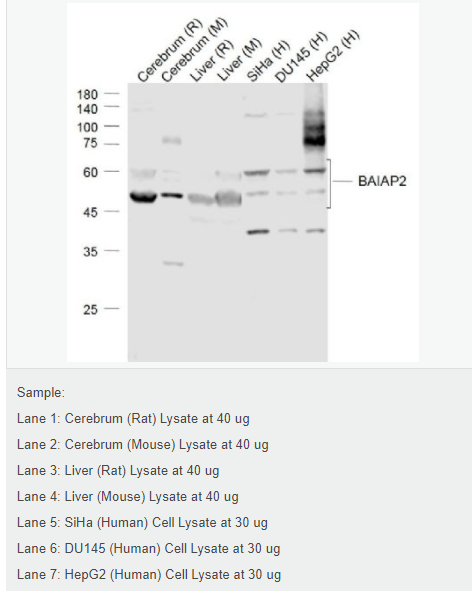

貨號
產(chǎn)品規(guī)格
售價(jià)
備注
BN40209R-100ul
100ul
¥2360.00
交叉反應(yīng):Human,Mouse,Rat 推薦應(yīng)用:WB,IHC-P,IHC-F,IF,ELISA
BN40209R-200ul
200ul
¥3490.00
交叉反應(yīng):Human,Mouse,Rat 推薦應(yīng)用:WB,IHC-P,IHC-F,IF,ELISA
產(chǎn)品描述
| 英文名稱 | BAIAP2 |
| 中文名稱 | 胰島素受體底物p53蛋白抗體 |
| 別 名 | Insulin receptor substrate P53; IRSp53; IRS P53; IRS-P53; Baiap2; BAI1 associated protein 2 isoform 3; Brain-specific angiogenesis inhibitor 1-associated protein 2; BAI1-associated protein 2; Insulin receptor tyrosine kinase substrate protein p53; Insulin receptor substrate p53; Insulin receptor substrate protein of 53 kDa; IRSp53; BAIP2_HUMAN; BAI-associated protein 2; BAI1-associated protein 2; Protein BAP2; Fas ligand-associated factor 3; Insulin receptor substrate p53/p58; Insulin receptor substrate protein of 53 kDa; FLAF3; IRS-58; IRSp53/58. |
| 研究領(lǐng)域 | 細(xì)胞生物 神經(jīng)生物學(xué) 細(xì)胞凋亡 細(xì)胞膜受體 糖尿病 內(nèi)分泌病 |
| 抗體來源 | Rabbit |
| 克隆類型 | Polyclonal |
| 交叉反應(yīng) | Human, Mouse, Rat, |
| 產(chǎn)品應(yīng)用 | WB=1:500-2000 ELISA=1:5000-10000 IHC-P=1:100-500 IHC-F=1:100-500 IF=1:100-500 (石蠟切片需做抗原修復(fù)) not yet tested in other applications. optimal dilutions/concentrations should be determined by the end user. |
| 分 子 量 | 61kDa |
| 細(xì)胞定位 | 細(xì)胞漿 細(xì)胞膜 |
| 性 狀 | Liquid |
| 濃 度 | 1mg/ml |
| 免 疫 原 | KLH conjugated synthetic peptide derived from human IRS P53:151-250/552 |
| 亞 型 | IgG |
| 純化方法 | affinity purified by Protein A |
| 儲 存 液 | 0.01M TBS(pH7.4) with 1% BSA, 0.03% Proclin300 and 50% Glycerol. |
| 保存條件 | Shipped at 4℃. Store at -20 °C for one year. Avoid repeated freeze/thaw cycles. |
| PubMed | PubMed |
| 產(chǎn)品介紹 | The protein encoded by this gene has been identified as a brain-specific angiogenesis inhibitor (BAI1)-binding protein. This interaction at the cytoplasmic membrane is crucial to the function of this protein, which may be involved in neuronal growth-cone guidance. This protein functions as an insulin receptor tyrosine kinase substrate and suggests a role for insulin in the central nervous system. This protein has also been identified as interacting with the dentatorubral-pallidoluysian atrophy gene, which is associated with an autosomal dominant neurodegenerative disease. It also associates with a downstream effector of Rho small G proteins, which is associated with the formation of stress fibers and cytokinesis. Alternative splicing of the end of this gene results in three products of undetermined function. Function: Adapter protein that links membrane-bound small G-proteins to cytoplasmic effector proteins. Necessary for CDC42-mediated reorganization of the actin cytoskeleton and for RAC1-mediated membrane ruffling. Involved in the regulation of the actin cytoskeleton by WASF family members and the Arp2/3 complex. Plays a role in neurite growth. Acts syngeristically with ENAH to promote filipodia formation. Subunit: Homodimer. Interacts with CDC42 and RAC1 that have been activated by GTP binding. Interacts with ATN1, BAI1, EPS8, SHANK1, SHANK2, SHANK3, WASF1 and WASF2. Interacts with ENAH after recruitment of CDC42. Interacts with TIAM1 and DIAPH1. Interacts (via SH3 domain) with E.coli effector protein EspF(U) (via PXXP motifs). Interacts with E.coli intimin receptor Tir. Subcellular Location: Cell Membrane and Cytoplasmic. Tissue Specificity: Isoform 1 and isoform 4 are expressed almost exclusively in brain. Isoform 4 is barely detectable in placenta, prostate and testis. A short isoform is ubiquitous, with the highest expression in liver, prostate, testis and placenta. Post-translational modifications: Phosphorylated on tyrosine residues by INSR in response to insulin treatment. Similarity: Contains 1 IMD (IRSp53/MIM homology) domain. Contains 1 SH3 domain. SWISS: Q9UQB8 Gene ID: 10458 Database links: Entrez Gene: 10458 Human Entrez Gene: 108100 Mouse Omim: 605475 Human SwissProt: Q9UQB8 Human SwissProt: Q8BKX1 Mouse Unigene: 128316 Human Unigene: 197534 Mouse Unigene: 95155 Rat Important Note: This product as supplied is intended for research use only, not for use in human, therapeutic or diagnostic applications. |
